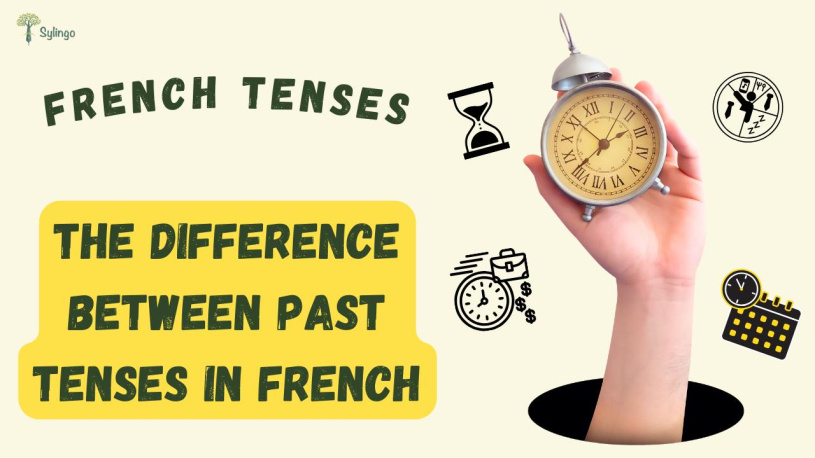There are several tenses used to express the past in the French language. In this lesson, we explored the differences between these tenses and when and how to use them.
Past Tenses:
There are six past tenses in French:
Le passé récent (The Recent Past):
- Le passé récent is used to describe a situation that just happened.
- Used orally and informally among friends and family.
- It is not considered a formal verb and is not used in official writings.
Examples:
Le bus vient de partir. Tu dois attendre le prochain.
The bus has just left. You have to wait for the next one.
Je viens de terminer mon travail.
I have just finished my work.
Le passé composé (The Compound Past):
- The primary tense used to express the past in French.
- Indicates a completed action that occurred during the speaker's narration.
Example:
J’ai préparé le rapport que tu m’avais demandé.
I prepared the report you asked for.
L'imparfait (The Imperfect):
- Used to describe general situations or habitual actions in the past.
- Often used concurrently with another past tense.
Example:
Quand j’étais petite, je jouais avec mes amies à l'école.
When I was little, I used to play with my friends at school.
Le plus-que-parfait (The Pluperfect):
- Indicates an action that happened before another past action.
- Often used in conjunction with other past tenses.
Example:
Quand Pierre est arrivé, Marie était parties.
When Pierre arrived, Marie had already left.
Le passé simple (The Simple Past):
- Primarily used in literature and storytelling.
- Less commonly used in spoken language.
Example:
Il partit sans dire un mot.
He left without saying a word.
Le passé antérieur (The Anterior Past):
- Expresses an action completed before another action in the past.
- Used less frequently and often in formal writing.
Example:
Après qu'il eut fini son travail, il partit.
After he had finished his work, he left.
The difference between the compound past "Le passé composé," the pluperfect "le plus-que-parfait," and the imperfect "l'imparfait":
We use these tenses to distinguish between different moments and organize the sequence of events in the past.
Le plus-que-parfait:
- The pluperfect indicates an action later than another action that occurred in the past.
- The verb in "Le plus-que-parfait" is later than a verb that happened earlier in the past. It is used to formulate the previous action in "l’imparfait" or "le passé composé."
Examples:
Quand Pierre est arrivé, Marie était partie.
When Pierre arrived, Marie had already left.
(Marie had left, and then Pierre arrived.)
J’ai préparé le rapport que tu m’avais demandé.
I prepared the report you asked for.
Le passé composé - The Compound Past:
- Le passé composé is commonly used.
- It indicates a past fact that was accomplished during the narration.
- It signifies an action that follows another action in the sequence of events.
Examples:
Quand Pierre est arrivé, Marie est partie.
When Pierre arrived, Marie left.
(Initially, Pierre arrived, and then Marie left.)
Hier, je suis allée chez ma sœur, nous avons regardé un film comique.
Yesterday, I went to my sister's house; we watched a comedy movie.
L'imparfait - The Imperfect:
- L'imparfait is used to describe general situations that are not specified in time.
- It is primarily used to describe events and express habitual actions that occurred repeatedly in the past.
- It indicates an action/event occurring concurrently with another action/event.
Example:
Quand Pierre est arrivé, Marie partait.
When Pierre arrived, Marie was leaving.
(Pierre arrived, and during that time, Marie was leaving.)
Quand j’étais petite, je jouais avec mes amies à l'école, et justement hier j'ai vu une amie de mon enfance.
When I was little, I used to play with my friends at school, and just yesterday, I saw a friend from my childhood.
Le passé composé and l'imparfait:
When used in the same sentence, l'imparfait expresses continuity, while le passé composé indicates the interruption of the action.
Example:
Hier soir, je regardais un film quand Marie a téléphoné.
Last night, I was watching a movie when Marie called.
(Continuously watching a movie, and then there was an interruption when Marie called.)
Understanding the nuances of these past tenses in French allows for precise expression of different past scenarios. Mastery of these tenses enhances one's ability to convey a rich temporal narrative in French.





